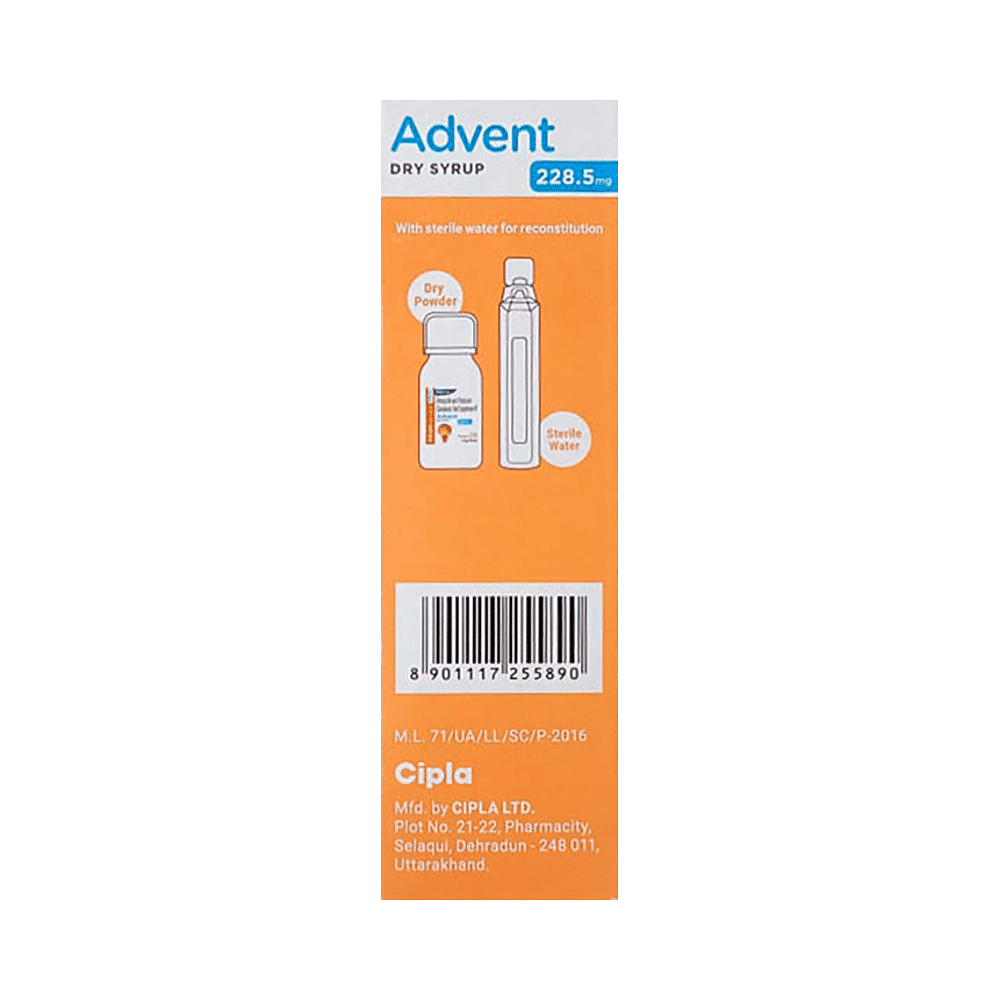
Avunox CV Dry Syrup
Manufacturer
Avunu Life Sciences
Salt Composition
Amoxycillin (200mg/5ml) + Clavulanic Acid (28.5mg/5ml)
Key Information
Short Description
Avunox CV Dry Syrup is an antibiotic medicine that helps treat bacterial infections of the ear, nose, throat, chest, lungs, teeth, skin, and urinary tract.
Dosage Form
Dry Syrup
Introduction
Avunox CV Dry Syrup is an antibiotic medicine that helps treat bacterial infections of the ear, nose, throat, chest, lungs, teeth, skin, and urinary tract. It is capable of killing bacteria that have become resistant to other therapies and thus also helps treat tuberculosis that is resistant to other treatments.
Directions for Use
Your child must complete the entire course of antibiotics. Stopping too soon may cause the bacteria to multiply again or cause another infection.
How it works
Avunox CV Dry Syrup is an antibiotic. It has two active agents amoxycillin and clavulanic acid. Amoxycillin works by preventing the formation of the bacterial protective covering (cell wall) essential for the survival of the bacteria. Whereas clavulanic acid serves a special purpose of inhibiting an enzyme (beta-lactamase) that is produced by resistant bacteria.
Quick Tips
Your child must complete the entire course of antibiotics. Stopping too soon may cause the bacteria to multiply again or cause another infection. Encourage your child to drink plenty of water in case diarrhea develops as a side effect. Never give Avunox CV Dry Syrup until and unless prescribed by the doctor. Do not give Avunox CV Dry Syrup to treat common cold and flu-like symptoms caused by viruses. Check ‘expiry’ before giving Avunox CV Dry Syrup to your child. Immediately discard all the expired medicines.
Related Medicines

Advent 228.5mg Dry Syrup Tangy Orange

Saumox CV Dry Syrup

UV Clav CV Dry Syrup

Anclov Dry Syrup

Stivmox CV Dry Syrup

Moximit CV Dry Syrup

Auxgo Dry Syrup

Yevoclav Dry Syrup

Monex-DS Dry Syrup

Pencimox CV Dry Syrup
Frequently asked questions
Can other medicines be given at the same time as Avunox CV Dry Syrup?
Avunox CV Dry Syrup may interact with other medications or substances. Always inform your child's doctor about all other medications they are taking before starting Avunox CV Dry Syrup. Additionally, consult your child's healthcare provider for guidance on administering any medicine to your child.
Can I get my child vaccinated while on treatment with Avunox CV Dry Syrup?
Generally, antibiotics do not interfere with vaccine ingredients or cause a negative reaction in children who have recently been vaccinated. However, it is crucial for children to recover from their illness before receiving any vaccines. Once your child feels better, the vaccine can be administered.
Which lab tests may my child undergo while taking Avunox CV Dry Syrup on a long-term basis?
Periodically, your doctor may order kidney and liver function tests during extended treatment with Avunox CV Dry Syrup to monitor the impact of the medication on your child's overall health.
Can I give a higher than the recommended dose of Avunox CV Dry Syrup to my child?
Giving an excessive dose of this medication can potentially increase the risk of side effects. If your child experiences increased symptom severity, consult your child's doctor for reevaluation.
Can I stop giving Avunox CV Dry Syrup to my child when the symptoms are relieved?
No, do not discontinue this medication unless the full course of treatment has been completed. Even if you feel better, it is important to continue taking the medicine for the prescribed duration. Symptoms may improve before complete infection resolution, and continued medication could still have beneficial effects.
Can the use of Avunox CV Dry Syrup cause diarrhea?
Yes, Avunox CV Dry Syrup can cause diarrhea. It is an antibiotic that eliminates harmful bacteria. Moreover, the medication may disrupt the balance of beneficial bacteria in your child's stomach, leading to diarrhea. If experiencing diarrhea, encourage your child to drink plenty of fluids. In case of persistent diarrhea or symptoms of dehydration (e.g., decreased urination with dark and foul-smelling urine), consult your doctor before administering any other medications.
Do all viral common colds result in secondary bacterial infection?
Most viral colds do not typically lead to bacterial infections. In fact, administering antibiotics to a viral cold can increase the risk of side effects. It is crucial to consult with your child's doctor before prescribing any antibiotics.
The mucus coming out of my child’s nose is yellow-green. Is it a sign of a bacterial infection?
Yellow or green nasal discharge does not necessarily indicate the need for antibiotics in a common cold. During a typical cold, mucus often thickens and changes from clear to yellow or green as symptoms progress. Symptoms typically last for 7 to 10 days.
Is there any sign which shows that my child needs immediate medical attention?
You should contact your child's doctor immediately if your child experiences serious allergic reactions (breathing difficulties, skin rashes), gastrointestinal problems like diarrhea, or liver damage such as weakness, pallor, and vomiting. While rare, these side effects can be severe and require immediate expert intervention.


